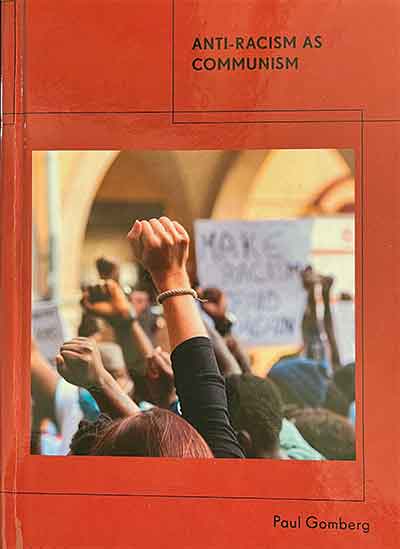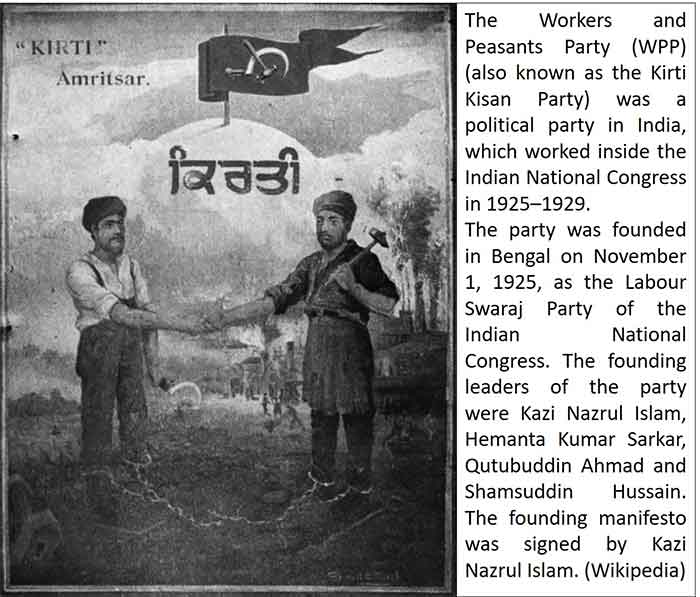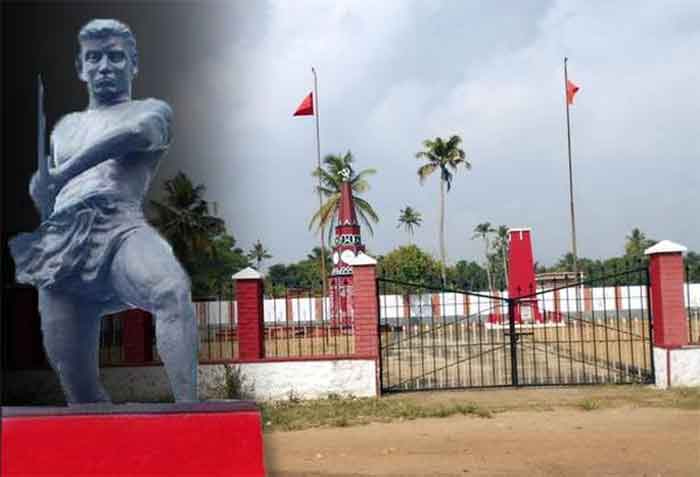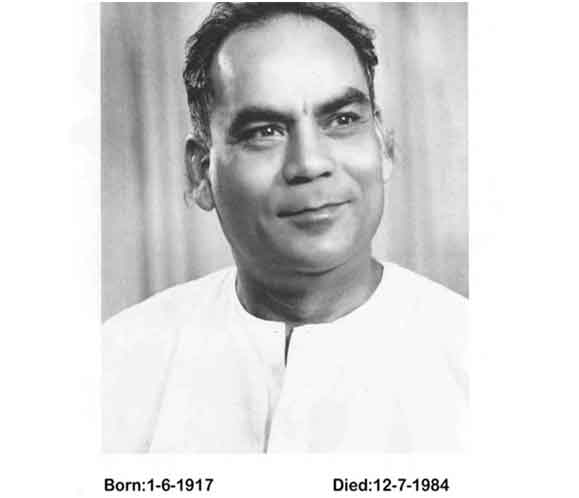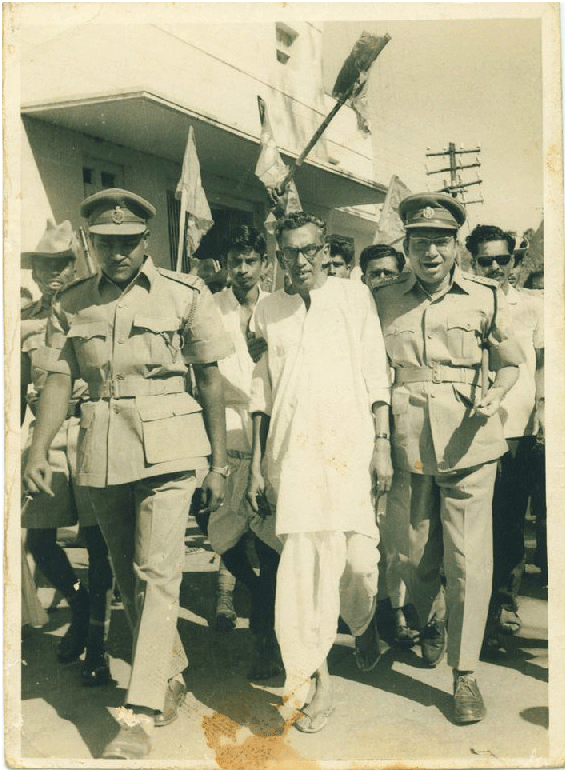
A lot of ordinary people in India – both women and men have a lot of respect for the communists and communist movement. It is based on their direct knowledge from interactions with the communists in trade union movements and other social and political movements. They are also impressed by the personal integrity of most of the communists. They are prepared to overlook aberrations of some of them.
They are puzzled as to why the communists had so little success. What went wrong? How did they get isolated? What major mistakes did they commit? This little article tries to answer these questions in simple language. It in no way obviates the need for a comprehensive analysis by veteran communists and academic scholars.
Pre-independence History
Gandhi
Many individuals were impressed by the news of the Russian Revolution by the early 1920s and some Indians living abroad also became communists. But it was the 1929 Great Depression that spread the idea of communism all over the world. It proved Marx’s prediction of periodic crisis of capitalism. But what impressed people was that the Soviet Union was unaffected by this crisis. The miseries that these events brought and the strikes by the workers gave birth to the communist movement in India.
However by that time the Indian National Movement had picked up energy and Gandhi was already established as a leader. Many early communists came from this movement and were influenced by Gandhi. They left Congress and Gandhi because Gandhi was rabidly anti-communist. Gandhi, to my knowledge, never talked about the Soviet Union or Socialism. He never visited the Soviet Union whereas most leaders did. Instead he went to the fascist Mussolini in December 1931, and even took a salute by his Blackshirts although his friend Romain Rolland advised him against going to Italy. Gandhi was opposed to class struggle and believed in class collaboration. He used the terms violence (for class struggle) and non violence (for class collaboration) in his own way for them. This effectively hid his agenda. Instead he talked about trusteeship where the rich were supposed to be the trustees of their wealth and property. Acharya Dharmanand Kosambi pointed out that there is a contradiction between Gandhi’s belief in ‘Aparigrha’ (non accumulation) and trusteeship. But Gandhi did not bother about it. However many leftist remained in Congress and formed the Congress Socialist Party which later changed to various socialist parties.
This background was a heavy chain around the feet of the communists. They adopted some of Gandhi’s moral stands like celibacy, vegetarianism and anti-alcohol ideas. This isolated them from ordinary workers and the communist movement got dominated by upper castes.
Quit India Movement
The Second World War turned into an fascist people’s war as Hitler attacked the Soviet Union. The Indian communists could not join the Quit India movement against the British because England was part of the anti-fascist alliance. This created a lifelong rift with the Socialists, who were normally allies of the communists. Secondly they got isolated from the Indian Mass Movement of Quit India. Thirdly, Indian mass imagination was captivated by Subhash Chandra Bose’s Indian National Army. But since Bose was taking the help of the fascist Japan, the Indian Communists could not support him! All this isolated the Indian communists.
Post Independence History
Caste
The Indian National Movement was dominated by upper caste Hindus. The lower castes had no place in it. It was Dalit leader, Dr. B. R. Ambedkar who successfully brought up the caste question and got some gains for the Dalits. His contribution, both in theory and practice, was formidable.
Communists have often been accused of not understanding the caste question. They thought that it was mainly a social question, belonging to the ‘superstructure’ of the society. They often relegated it to a ‘social reform’ kind of activity. Abolition of untouchability, inter caste marriage, discrimination in public places like hotels, schools etc.
They never understood Ambedkar’s definition of caste as ‘closed class’. What he meant was that caste is a class where endogamy or marriage outside the caste is prohibited. D. D. Kosambi compared castes to medieval guilds of Europe.
In practice also the communists made major mistakes. In the Textile industry of Bombay the Dalits were not allowed some jobs where they had to join the broken thread with the saliva of their mouth. The reason was they were considered untouchables. The communist union, the Girni Kamgar Union did not take the side of the Dalits. Ambedkar was also active in the Bombay labour movement. He argued for abolition of this prejudice. The Union agreed with great reluctance. This created a lifelong distance between the communists and Dalits. Ambedkarites correctly called the communists as ‘manuvadi’ – followers of upper caste Hinduism. A great opportunity of unity of the oppressed classes was lost.
Today Dalit intellectual Anand Teltumble maintains that the classical caste divisions among Dalits have vanished. They are all landless labourers and they should unite as a class. In Delhi and in some other places, left wing student leaders are trying hard to create a unity among Dalits and communists.
National Question
India is a federal reality. The tension between central and state is one of the main driving forces of Indian polity. India is more like Europe with different regions and languages. In addition India also has ten developed scripts each with a significant printing history.
Unfortunately Indian political parties, including the communists refuse to accept this reality. For them India is a nation and it has to have a National language, which some want it to be Hindi. This has created enormous obstacles in the practical political work of the communist party in India and often resulted in losses. For example they have no clear line about supporting a demand for a separate state within the Indian Union – like Jharkhand, Chhattisgarh, and Uttarakhand. There are at least ten such movements waiting on the side and the communist have no clear stand on it. During the three movements mentioned above there was confusion among the communist and it was rebel leaders like A.K. Roy (in Jharkhand) and Shankar Guha Niyogi in Chhattisgarh who supported. However, not having a clear idea and full force of the party behind it they could not get full benefit from it. Earlier in Samyukta Maharashtra and Telugu Desam movement the communists joined opportunistically and suffered heavy losses among their ranks.
Part of the confusion is due to Stalin’s thesis identifying nations with language. So although the Soviet Union was a federation, Russia was a dominant nation within it and the Russian language dominated. The Indian Constitution has some federal aspects but it is mainly unitary. This was the main reason for the formation of Pakistan. A united India would necessarily have been federal, as Pakistan is today. But the Indian bourgeoisie, who were strong after making huge profits during the war, wanted a unified market for themselves. Later when the demand for the linguistic states came they opposed it tooth and nail and wanted just parallel lines dividing the states as in the United States. GST is just another example of this unitary trend.
The Language Question
Due to the anti fascist movement a lot of democratic tendencies came in academics. Today the position is:
- All languages are equal. There is nothing called a dialect.
- The standard language is a language with a gun.
Thus not only all Indian languages are equal, but even the so-called dialects are also equal. Take the example of Marathi. The Pune Marathi is considered standard as Pune was the centre of power during the Peshwas. Today’s Maharashtra has five ecoregions: Desh (Western Ghats, Pune is located here), Konkan (Coastal Maharashtra), Marathwada (Central, with Aurangabad as its main city), Vidarbha (North East Maharashtra with Nagpur as its main city) and Khandesh (North West Maharashtra). A thumb rule is that each ecoregion has a language and a potential nation/nationality! So the demand for Vidarbha as a separate state has been there for many years. This author has estimated that there are 65 such eco regions and India can have a federation of 65 states! One need not be shocked at it. British India had nearly five hundred local kings and states! If we want to imagine a Federation of South Asia it will be nearly 100 states!
It will be good if the communist party units have organizations at a local eco zone basis. They should be good in knowing the local language, culture, folklore, agriculture and industry etc. Then they will be effective.
Communalism
Communists have an exemplary tradition in opposing communalism and supporting secularism. In the 60s my teacher, Dr. M. N. Farooqui told me that communists are the only truly secular people in India. Again my own initiation in the movement began when I was asked to help to protect a Muslim locality in Rajabazar, near Science College in Calcutta, when it was threatened with a possibility of a communal riot. I was told that in the communist tradition Hindu comrades protect Muslims localities and Muslim comrades protect Hindu localities in cases of communal tension.
Now if the communists were also firmly located in the local community they could also be effective leaders in peace committees and make their area communal tension free.
We must realize that communalism is not uniformly spread all over the country though the Hindutva outfit would like it to be so. We should understand its origins. Essentially it has roots in the 19th century Hindu renaissance and it was mainly located in North West India and Bengal. It was essentially a movement of educated Hindu middle class. It had three components: 1. responding to the Christian missionary’s criticism against the ‘evils’ of Hinduism. They wanted to shed some ‘bad’ texts and practices and wanted jobs in the new Company Raj 2. It was pro-British and rabidly anti Muslim. 3. The British played the ‘divide and rule’ policy. They made Persian as the language of the courts as it was already there since the Mughal time and naturally Muslims had more jobs in the new situation.
Communists should recognize this history and concentrate on making the rest of India communal tension free. Then of course special attention should be paid to these historically special regions. It will be easier if the communist units are truly immersed with the local community as we said above. I think communists have a huge potential for leadership in this field.
Critic of the State – Ignorance of the Anarchist Tradition
Lenin in his book, ‘State and Revolution’ urged comrades to read anarchist literature to have a good critic of the State. The idea was that comrades will understand that Socialism was only a phase in the development of history and the next stage will be anarchism! We might as well define anarchism as we go along to avoid misunderstanding. Briefly: 1. Anarchists are opposed to all authority, 2. Anarchists believe in self management within a local community on the basis of ‘a free association of free people’, and 3. The Anarchist community will federate with other communities also on the basis of ‘a free association of free people’.
What does it mean in practice? Communist organizations should implement ‘self management’ in their organizations. Thus trade unions or peasant organizations in their structure and functioning should be ‘socialist’ and ‘democratic’ and not hierarchical copying the ruling class! In addition they should start building socialism ‘here and now’, like the Chinese communist party did in liberated areas.
In the 80s comrades like A. K. Roy and Shankar Guha Niyogi understood it to some extent and tried to implement it also. Niyogi’s slogan ‘Sangharsh aur Nirman’ (Struggle and Construction) reflects this.
There is an urgent need that the communist should drop their antipathy towards anarchism and treat it as part of their programme. Chomsky does this and many other modern comrades are doing this.
Contemporary Sensibilities
The world is going through a deep crisis. It is a global emergency and the capitalist system is on the verge of collapse and life on earth is endangered. This began with the 2008 financial meltdown and is exasperated by global warming and resource depletion. The capitalist response is the so-called ‘Fourth Industrial Revolution’. No mainstream political parties, including the communist parties have a proper alternative. They cannot get out of the agenda of industrialization or development.
Outside the mainstream there are a lot of groups who are talking and practicing alternatives and asking for stopping the development projects and asking for degrowth.
Masses or people who have experienced the ill effects of these policies have been protesting for a long time. From the early seventies, in the wake of revolutionary movements that started in the late 60s the consciousness about the evils of development began to grow. One of the earliest was the Silent Valley Movement in the Palakkad district of Kerala. It was started in 1973 to save the Silent Valley Reserve Forest from being flooded by a hydroelectric project. Since then there have been movements in practically every state in India. For example , Koel Karo movements in Jharkhand, Narmada Bachao Andolan spread over three states, Niyamgiri movement in Odisha, and Save Western Ghats which also was spread over several states and so on. While in most cases the movements ‘failed’ to achieve their goals, they transformed millions of people in their attitude towards ‘development’. These movements have prepared grounds for the alternatives to emerge – organic farming, education, health care, water harvesting, local self sufficiency etc.
None of the mainstream political parties have participated or supported these movements in any significant way. Some units of the far left have supported and rebels in parties or some members of the opposition parties have also supported once in a while. In West Bengal the CPI (M) lost power due to their blatant support of the development agenda.
During the three month of the lockdown during the pandemic, all of us learned an important lesson. In a real crisis, the government just gives up and that the people can take care of themselves. Not only the government, here again mainstream parties were conspicuous by their absence!
While there were indeed a lot of sufferings, the people from all walks of life showed remarkable resilience. And Nature recovered at a speed that surprised even the experts. So if and when capitalism collapses, and it seems that we are in the middle of it, there are actually a lot of positive things to look forward to!
T Vijayendra (1943 – ) was born in Mysore, grew up in Indore and went to IIT Kharagpur to get a B. Tech. in Electronics (1966). After a year’s stint at the Saha Institute of Nuclear Physics, Kolkata, he got drawn into the whirlwind times of the late 60s.
Since then, he has always been some kind of political-social activist. His brief for himself is the education of Left-wing cadres and so he almost exclusively publishes in the Left-wing journal Frontier, published from Kolkata. For the last ten years, he has been active in the field of ‘Peak Oil’ and is a founder member of Peak Oil India and Ecologise. Since 2015 he has been involved in Ecologise! Camps and in 2016 he initiated Ecologise Hyderabad. In 2017 he spent a year celebrating the Bicentenary of the Bicycle. Vijayendra has been a ‘dedicated’ cyclist all his life, meaning, he neither took a driving license nor did he ever drive a fossil fuel-based vehicle.
He divides his time between Hyderabad and organic farms at several places in India, watching birds and writing fiction. He has published a book dealing with resource depletion, three books of essays, two collections of short stories, a novella, an autobiography and a children’s science fiction story on the history of the bicycle, apart from booklets on several topics. His booklet, Kabira Khada Bazar Mein: Call for Local Action in the Wake of Global Emergency (2019, https://archive.org/details/kabira-khada-bazaar-mein) has been translated into Kannada, Bengali and Marathi and is the basic text for the emerging Transition Networks in these language regions. His last book ‘Vijutopias’, which has 12 short stories, is an entertaining book full of hope and energy in these dismal times.
Email: [email protected]

